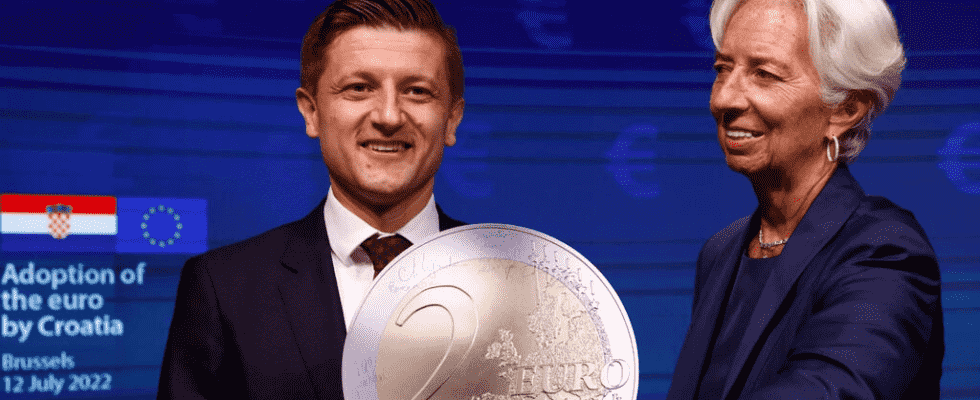Goodbye kuna, hello euro. On January 1, 2023, Croatia becomes the 20th country to adopt the single European currency. Membership expected for this country whose economy is already closely linked to the euro zone.
Less than 30 years after a devastating conflict and its independence from the former Yugoslavia, Croatia is entering both the euro zone and the Schengen area on January 1, 2023. A consecration for this Balkan country of barely 4 million inhabitants, which joined the European Union in 2013.
A rapid rise made possible by a proactive European policy and scrupulous respect for the criteria defined by Brussels. From 2020, Croatia will join the European Exchange Rate Mechanism (ERM), considered the antechamber to the single currency. In July 2022, the 27 approve the country’s entry into the monetary union.
” Very strong economic integration with the euro zone »
” Croatia meets all economic and legislative criteria to join the euro area : independence of the Croatian Central Bank, price stability, sustainability of public finances and stability of the exchange rate of the kuna vis-à-vis the euro “, explains Florian Le Gallo, economist at the Banque de France and specialist in the euro zone.
Beyond these criteria, Croatia has demonstrated very strong economic integration with the euro zone since its entry into the Union. Indeed, the country achieves 53% of its exports to the euro zone. The adoption of the single currency should enable it to facilitate and increase these exchanges with its European partners, in particular by lowering exchange costs. ” This should further support Croatia’s growth potential and foster integration with the rest of the Eurozone. “, underlines the economist.
An integration whose origins date back to the 1990s, when the country’s economy was already closely linked to the Deutsche Mark, the German currency at the time, due to the instability of the national currency. This continued with the euro. The use of the single currency is already widespread in the country, since half of bank loans and deposits are made in euros. And Croatians are used to using it for their most important purchases, such as cars or real estate.
► To read also: Green light for Croatia’s entry into the Schengen area, Romania and Bulgaria failed
Multiple opportunities for Croatian growth
There are many advantages for Croatian households and businesses: in addition to eliminating conversion costs between the euro and the kuna, it broadens the investor base and facilitates access to financial markets. Zagreb thus hopes to see its economy and the standard of living of its inhabitants converge with the European average.
For Florien Le Gallo, it is difficult to say whether this will make it possible to curb the brain drain, a feature common to all the countries of central and eastern Europe which have joined the Union. ” The support for the growth of the Croatian economy enabled by the adoption of the euro should strengthen the capacities and opportunities for Croatian citizens in their own country “, however, says the economist.
The tourism sector, which accounts for nearly 20% of GDP, hopes to benefit from this dual membership. European vacationers, who represent two thirds of tourists in Croatia, can now freely reach the Adriatic coast, without having to change their euros.
► To read also: The Schengen area, eldorado or sieve?
